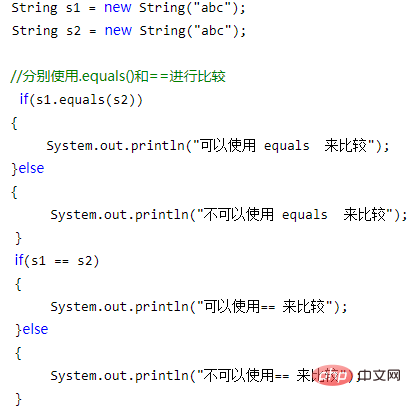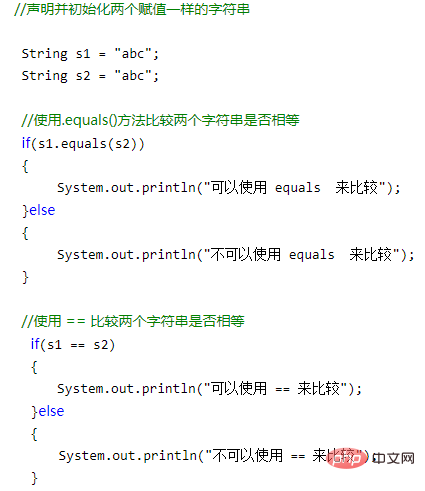How to use if statement to determine whether strings are equal in java

First analyze and use == (Note: = in Java is the assignment operator, == is the comparison of equality) and the equals() method to compare two The difference between string equality:
== compares whether the addresses of two strings are equal (the same address), and the equals() method compares whether the contents of two string objects are the same (of course , if two strings refer to the same address, comparison using equals() will also return true).
Recommended related learning videos: java video
The following will give two examples to analyze the string comparison problem in the two situations:
Example 1, use the new keyword to declare two String type variables

When running the program, it is found that comparing with equals returns true, and comparing with == returns false. The reasons are as follows:
Because == compares whether the addresses of two string objects are the same (whether they are the same address). When using the new keyword to create an object, the object occupies a separate storage space. , stores the value of the string llg. Therefore, although the two strings s1 and s2 have the same value, the stored address is not the same address.
When using == to compare, the comparison is whether the addresses of the two strings are the same, so false is returned. But using the equals() method to compare these two strings will compare whether the values of the two strings are the same, so it returns true.
Example 2, string declaration and definition under normal circumstances

After running the program, it was found that both methods returned true . So why is this? The reasons are as follows:
Generally we believe that basic type variables and object reference variables are stored in the stack, while objects and arrays generated by new are stored in the heap. However, in addition to this, there is an area called the constant pool. Like we usually think of String s1 = "abc"; The value of a string object declared like this is stored in the constant pool.
When we create String s1 = "abc"After such an object, "abc" is stored in the constant pool, when we create a reference String s2 = "abc" , the bottom layer of Java will first search whether "abc" exists in the constant pool. If it exists, let s2 point to this value and will not recreate it. So when comparing using ==, because the addresses are the same, the comparison result is true.
Then the question comes back. Since there is a constant pool, is it true that if the string is not new (generally it is not so new, declaring a string variable is usually written like Example 2), then these strings They all refer to the same object from the constant pool, so just use == for comparison? The answer is yes.
Recommended related articles and tutorials: Getting started with java
The above is the detailed content of How to use if statement to determine whether strings are equal in java. For more information, please follow other related articles on the PHP Chinese website!

Hot AI Tools

Undresser.AI Undress
AI-powered app for creating realistic nude photos

AI Clothes Remover
Online AI tool for removing clothes from photos.

Undress AI Tool
Undress images for free

Clothoff.io
AI clothes remover

Video Face Swap
Swap faces in any video effortlessly with our completely free AI face swap tool!

Hot Article

Hot Tools

Notepad++7.3.1
Easy-to-use and free code editor

SublimeText3 Chinese version
Chinese version, very easy to use

Zend Studio 13.0.1
Powerful PHP integrated development environment

Dreamweaver CS6
Visual web development tools

SublimeText3 Mac version
God-level code editing software (SublimeText3)

Hot Topics
 Perfect Number in Java
Aug 30, 2024 pm 04:28 PM
Perfect Number in Java
Aug 30, 2024 pm 04:28 PM
Guide to Perfect Number in Java. Here we discuss the Definition, How to check Perfect number in Java?, examples with code implementation.
 Weka in Java
Aug 30, 2024 pm 04:28 PM
Weka in Java
Aug 30, 2024 pm 04:28 PM
Guide to Weka in Java. Here we discuss the Introduction, how to use weka java, the type of platform, and advantages with examples.
 Smith Number in Java
Aug 30, 2024 pm 04:28 PM
Smith Number in Java
Aug 30, 2024 pm 04:28 PM
Guide to Smith Number in Java. Here we discuss the Definition, How to check smith number in Java? example with code implementation.
 Java Spring Interview Questions
Aug 30, 2024 pm 04:29 PM
Java Spring Interview Questions
Aug 30, 2024 pm 04:29 PM
In this article, we have kept the most asked Java Spring Interview Questions with their detailed answers. So that you can crack the interview.
 Break or return from Java 8 stream forEach?
Feb 07, 2025 pm 12:09 PM
Break or return from Java 8 stream forEach?
Feb 07, 2025 pm 12:09 PM
Java 8 introduces the Stream API, providing a powerful and expressive way to process data collections. However, a common question when using Stream is: How to break or return from a forEach operation? Traditional loops allow for early interruption or return, but Stream's forEach method does not directly support this method. This article will explain the reasons and explore alternative methods for implementing premature termination in Stream processing systems. Further reading: Java Stream API improvements Understand Stream forEach The forEach method is a terminal operation that performs one operation on each element in the Stream. Its design intention is
 TimeStamp to Date in Java
Aug 30, 2024 pm 04:28 PM
TimeStamp to Date in Java
Aug 30, 2024 pm 04:28 PM
Guide to TimeStamp to Date in Java. Here we also discuss the introduction and how to convert timestamp to date in java along with examples.
 Java Program to Find the Volume of Capsule
Feb 07, 2025 am 11:37 AM
Java Program to Find the Volume of Capsule
Feb 07, 2025 am 11:37 AM
Capsules are three-dimensional geometric figures, composed of a cylinder and a hemisphere at both ends. The volume of the capsule can be calculated by adding the volume of the cylinder and the volume of the hemisphere at both ends. This tutorial will discuss how to calculate the volume of a given capsule in Java using different methods. Capsule volume formula The formula for capsule volume is as follows: Capsule volume = Cylindrical volume Volume Two hemisphere volume in, r: The radius of the hemisphere. h: The height of the cylinder (excluding the hemisphere). Example 1 enter Radius = 5 units Height = 10 units Output Volume = 1570.8 cubic units explain Calculate volume using formula: Volume = π × r2 × h (4
 PHP vs. Python: Understanding the Differences
Apr 11, 2025 am 12:15 AM
PHP vs. Python: Understanding the Differences
Apr 11, 2025 am 12:15 AM
PHP and Python each have their own advantages, and the choice should be based on project requirements. 1.PHP is suitable for web development, with simple syntax and high execution efficiency. 2. Python is suitable for data science and machine learning, with concise syntax and rich libraries.






